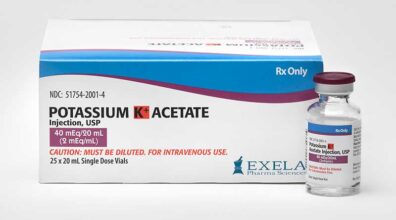Dear Health Care Provider:
Re: RISK OF POTENTIAL ALUMINUM TOXICITY WITH USE OF POTASSIUM ACETATE 40 MEQ/20 ML INJECTION PARTICULARLY IN NEONATAL PATIENTS AND PATIENTS WITH RENAL IMPAIRMENT
The purpose of this letter is to inform you of important safety information for Potassium Acetate 40 meq/20 mL (2 meq/mL) Injection (NDC 51754-2001-4), manufactured and supplied by Exela Pharma Sciences, LLC (“Exela”). The current carton and vial labels for Exela’s Potassium Acetate 40 meq/20 mL (2 meq/mL) Injection indicate the product contains an aluminum level of not more than 200 mcg/L. We have determined that the actual aluminum level in some instances may exceed 200 mcg/L in the product.
Potassium acetate injection is a source of potassium, for addition to large volume intravenous fluids, to prevent or correct hypokalemia in patients with restricted or no oral intake, or to prepare IV fluids when the needs of the patient cannot be met by standard electrolyte or nutrient solutions. The labeling for the product contains the following warning about aluminum:
WARNING: This product contains aluminum that may be toxic. Aluminum may reach toxic levels with prolonged parenteral administration if kidney function is impaired. Premature neonates are particularly at risk because their kidneys are immature, and they require large amounts of calcium and phosphate solutions, which contain aluminum.
Research indicates that patients with impaired kidney function, including premature neonates, who receive parenteral levels of aluminum at greater than 4 to 5 mcg/kg/day accumulate aluminum at levels associated with central nervous system and bone toxicity. Tissue loading may occur at even lower rates of administration.
Potassium acetate lots already in distribution may have aluminum levels that may exceed 200 mcg/L. To prevent an immediate shortage of potassium acetate, Exela, in coordination with the FDA, is releasing potassium acetate with an aluminum content that may exceed the amount stated on the product’s labels.
Due to the potential for serious aluminum toxicity concerns in vulnerable patient populations, specifically in premature neonates, Exela urges the Health Care Provider to follow the guidance provided below under Health Care Provider Action and use the product only if the total aluminum level of the entire infusion is acceptable.
HEALTH CARE PROVIDER ACTION
Health Care Providers administering the drug should calculate a patient’s total aluminum exposure from multiple parenteral sources and make appropriate substitutions to prepare “low aluminum” parenteral solutions for use in patients who are in high risk groups. Such high risk groups include premature neonates and patients with renal impairment. For purposes of the calculation, the Provider should assume that the aluminum content of Exela’s Potassium Acetate 40 meq/20 mL (2 meq/mL) is 500 mcg/L or 10 mcg/20 mL vial (or 0.5 mcg/mL).
The labeling for Exela’s Potassium Acetate Injection provides the following dosing recommendation:
The dose and rate of administration are dependent upon the individual needs of the patient. ECG and serum potassium should be monitored as a guide to dosage. Using aseptic technique, all or part of the contents of one or more vials may be added to other intravenous fluids to provide any desired number of milliequivalents (mEq) of potassium (K+) with an equal number of milliequivalents of acetate (CH3COO–).
Normal daily requirements:
Newborn: 2-6 mEq/kg/24 hr.
Children: 2-3 mEq/kg/24 hr.
Adult: 40-80 mEq/24 hr.
Assuming that providing maximum normal daily requirement (i.e., 6 mEq/kg/24 hr) for a newborn patient is the intended objective, at the suggested aluminum content of 500 mcg/L in Exela’s product, the amount of aluminum delivered to the patient would be (500 mcg/L * (6 mEq/kg/24 hr)/2 mEq/mL) 1.5mcg/kg/24 hr. Parenteral levels of aluminum greater than 4 to 5 mcg/kg/day, particularly in patients with impaired kidney function and in premature neonates, have been associated with central nervous system and bone toxicities due to aluminum accumulation. By itself, the Exela’s Potassium Acetate 40 mEq/20 mL Injection product should not pose health risk at the recommended administration level,. However, when this product is used in parenteral solutions containing other sources of aluminum, the product may significantly contribute to a patient’s total daily aluminum exposure in excess of the maximum normal daily requirement.
Reporting Adverse Events
Health care providers and patients should report adverse events in patients taking Potassium Acetate 40 meq/20 mL (2 meq/mL) Injection to Exela Pharma Sciences, LLC at 1-888-451-4321.
Adverse events or quality problems experienced with the use of this product may also be reported to the FDA’s MedWatch Adverse Event Reporting Program either online, or regular mail, or by fax:
- Complete and submit the report Online: www.fda.gov/medwatch/report.htm
- Regular mail or Fax: Download form www.fda.gov/MedWatch/getforms.htm or call 1-800-332-1088 to request a reporting form, then complete and return to the address on the pre-addressed form, or submit by fax to 1-800-FDA-0178.
You may also contact our medical information department at 1-888-451-4321 or our agent, Propharma Group, at 1-877-443-0226 if you have any questions about the information contained in this letter or the safe and effective use of Potassium Acetate 40 meq/20 mL (2 meq/mL) Injection.
This letter is not intended as a complete description of the benefits and risks related to the use of Potassium Acetate 40 meq/20 mL (2 meq/mL) Injection. Please refer to the enclosed full prescribing information.
Sincerely,
Phanesh Koneru, Ph.D., LL.M.
President & CEO

 888-451-4321
888-451-4321